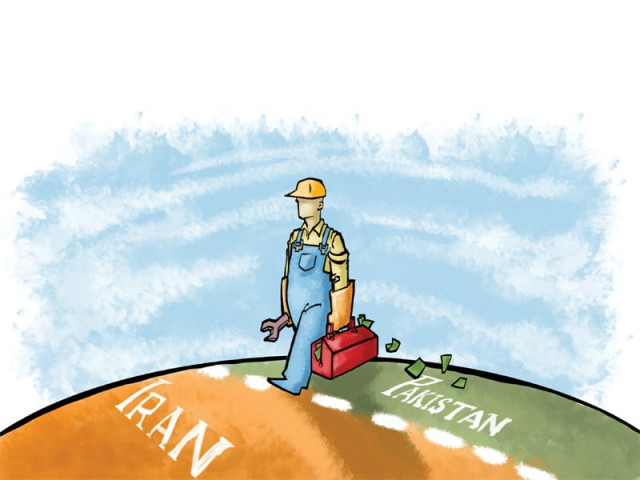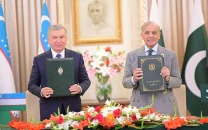Power import: Pakistan, Iran work out a detour for payments
Islamabad will pay dues to Iranian construction firm in Pakistan on behalf of Tehran.

Pakistan found a loophole to avoid sanctions in the backdrop of the economic blockade imposed by the US and the EU on Iran for its alleged nuclear programme. ILLUSTRATION: JAMAL KHURSHID
After local banks backed out, Pakistan and Iran have worked out alternative methods of paying bills of import of power to Balochistan through an Iranian company.
Pakistan found a loophole to avoid sanctions in the backdrop of the economic blockade imposed by the United States and the European Union on Iran for its alleged nuclear programme. Tehran insists its power programme is peaceful.
At present, Iran is exporting 74 megawatts (MW) per day to the border areas of Balochistan as well as Gwadar, but Pakistan had not been able to carry out banking transactions with Tehran since June 2011 after the US and the EU intensified sanctions. The outstanding amount had swelled up to $50 million.
Iran had been exporting electricity through a 132-kilovolt transmission line. In 2006, Pakistan was importing 39MW, which was later increased to 75MW.
Earlier, the Iranian firm exporting electricity to Pakistan had also threatened to cut power supply due to delay in payments of dues.
“Now, the issue of payment has been settled as Iran has asked Pakistan to pay the relevant amount to an Iranian construction company engaged in construction work in Pakistan, which will make onward payments to the company engaged in exporting power to Pakistan,” sources said.
The dues will be paid to the Iranian construction firm in Pakistan’s local currency – the rupee – that will result in saving precious foreign exchange.
Previously, a Pakistani bank had offered to carry out transactions with sanctions-hit Iran to clear dues, but the bank backed out due to US’s pressure. The central bank – State Bank of Pakistan – had endorsed the proposed payment method for power imports from Tehran.
Under the 1,000MW power import project, Iran will build a powerhouse in Zahedan province bordering Pakistan to generate electricity for export. Iran had also expressed its willingness to provide a loan of $800 to $900 million for the project.
A 700-kilometre transmission line of 500 kilovolts will also be laid from the Pakistan-Iran border to Quetta, Balochistan.
Iran had also expressed interest in setting up a 200MW power plant in Balochostan. Moreover, Tehran was also keen on installing smaller plants of 25MW each on the ground as well as on barges to help Pakistan overcome the prevailing power crisis. But, all the proposed plans stalled due to the sanctions imposed by the West.
“However, the main issue standing between realisation of the projects is the payment of dues to Iran,” experts said, adding that other countries like Turkmenistan and Turkey were also facing payment issues with ran.
Iran owed Turkmenistan $1 billion in December 2012 for importing gas and due to difficulties in transfer of funds, Turkmenistan followed by international restrictions. On the other side during the same month, Turkey had offered barter trade and payment in gold to Iran for importing natural gas due to hurdles in cash payments.
Experts said that Pakistan will also face payment transfer issues for importing gas through the Iran-Pakistan pipeline project. However, the same aforesaid formula for importing electricity can be implemented.
Published in The Express Tribune, January 15th, 2013.
Like Business on Facebook to stay informed and join in the conversation.



















COMMENTS
Comments are moderated and generally will be posted if they are on-topic and not abusive.
For more information, please see our Comments FAQ